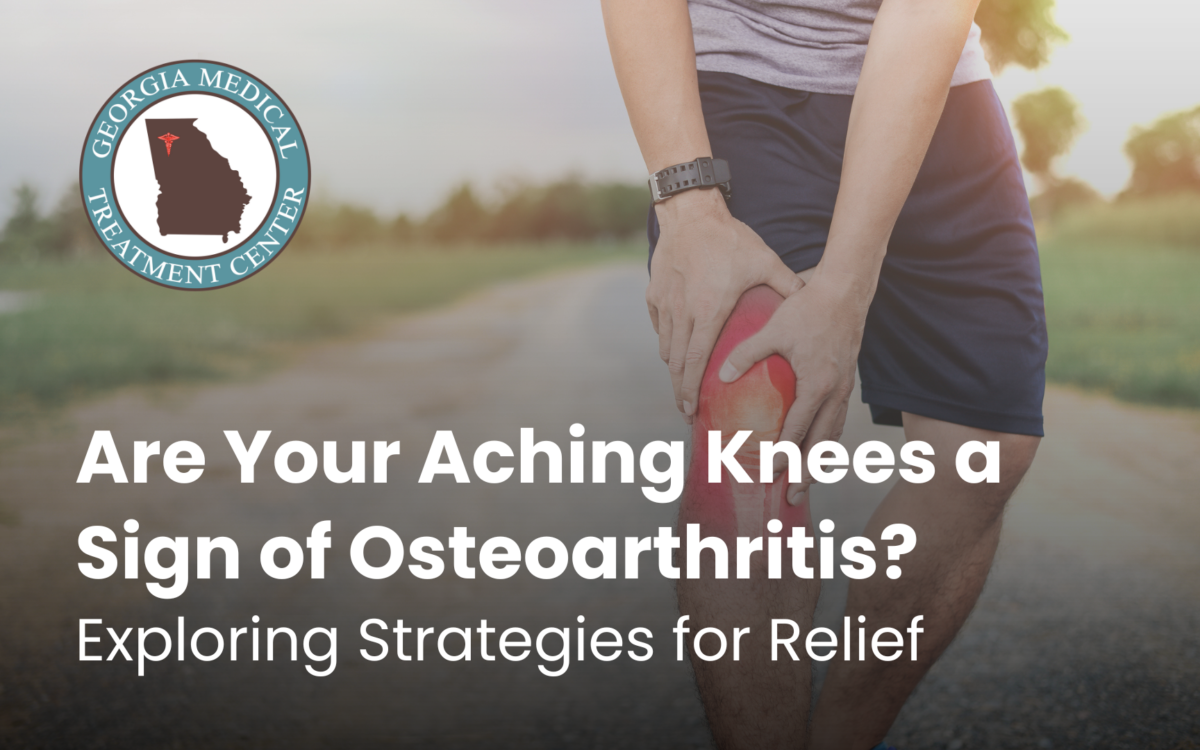Are Your Aching Knees a Sign of Osteoarthritis? Exploring Strategies for Relief
Experiencing discomfort or pain in your knees? It’s a common issue that can arise from various causes, whether it’s due to a specific injury or a gradual onset of symptoms. One potential explanation for this persistent discomfort is osteoarthritis, a condition that affects the joints, including the knees. In this blog, we’ll delve into the intricate nature of knee pain, exploring potential causes beyond osteoarthritis and discussing various treatment options available through our team of specialized knee pain doctors. Whether your knee pain stems from osteoarthritis or another source, our goal is to provide comprehensive care to help you regain comfort, mobility, and overall well-being.
What Are the Symptoms of Osteoarthritis?
In the United States, osteoarthritis affects over 32 million adults. Often referred to as “wear and tear disease,” the condition causes the fluid and cartilage that cushions the knees and joints to break down. Over time, this may cause serious knee pain that restricts mobility. Here are some common symptoms of osteoarthritis:
- Painful, stiff joints: Painful and stiff joints are symptoms of osteoarthritis, often presenting as a result of the gradual deterioration of cartilage within the affected joints. Individuals with osteoarthritis commonly experience discomfort, tenderness, and reduced flexibility in the affected joints, which can significantly impair mobility and quality of life.
- Swelling and tenderness: Individuals with osteoarthritis often notice swelling around the joints, accompanied by a sensation of warmth and tenderness upon touch. This inflammation can exacerbate pain and stiffness, further limiting joint mobility and function.
- Loss of flexibility and motion: Loss of flexibility and motion is a common consequence of osteoarthritis, as the condition progressively damages the joint structures, including cartilage and surrounding tissues. Individuals with osteoarthritis often experience a gradual reduction in joint flexibility and range of motion, making it difficult to perform everyday activities such as bending, squatting, or reaching.
- Poor balance: Poor balance is another prevalent symptom associated with osteoarthritis, particularly in weight-bearing joints like the knees and hips. The degradation of joint structures and accompanying pain and stiffness can disrupt proprioception, the body’s awareness of its position in space, leading to difficulties in maintaining stability.
- Popping and crackling knees: Popping and cracking sensations in the knees are common occurrences in individuals with osteoarthritis, often stemming from the irregularities in joint surfaces caused by cartilage degeneration.
- Hard lumps around the knees: Hard lumps around the knees can be indicative of osteophytes, also known as bone spurs, which commonly develop in individuals with osteoarthritis.
While anyone can experience osteoarthritis, the condition typically affects people over the age of 50. The risk is even higher for women and people with a family history of the condition.
What Knee Pain Treatments Are Available?
Now that you know what osteoarthritis is, you might be wondering: How can I treat it? At Georgia Medical Treatment Center, we offer the following non-surgical, FDA-approved treatments:
- All-natural knee injections: Our injection-based therapies harness the power of platelet-rich-plasma, a natural bodily fluid that accelerates healing processes. After isolating the concentrated growth factors in your plasma, these healing substances are injected directly into the joints.
- Gel injections (viscosupplementation): These injections replace fluid that’s been lost, providing much-needed lubrication around the knees.
- Steroid injections: Using numbing steroids, these injections reduce pain and inflammation in knee joints.
- Physical therapy: Our injection-based treatments are often paired with physical therapy, a personalized, exercise-based treatment plan that helps build muscle and joint strength.
- Bracing & support: We offer adjustable, durable knee-unloading support devices that expand joint space, reducing pressure on the knee cartilage.
We’ll start with a comprehensive, diagnostic test that gives us a better idea of your knee pain. In addition to a physical examination, we utilize imaging scans and ask in-depth questions about your pain history and current symptoms. Once we’ve pinpointed the cause and extent of your pain, we’ll draft a treatment plan customized for your needs. All of our treatments are minimally invasive, ensuring you avoid the unsavory side effects that come with complex knee surgeries.
Discover Knee Pain Treatment in Canton Today!
Looking for long-term relief? The knee pain specialists at Georgia Medical Treatment Center are here to help. Our team features an association of board-certified medical doctors and practitioners, all working together to devise highly effective, individualized patient treatment plans. Through our minimally invasive knee therapies, you can overcome the problems associated with osteoarthritis and get back to a pain-free life. Book your consultation today!
